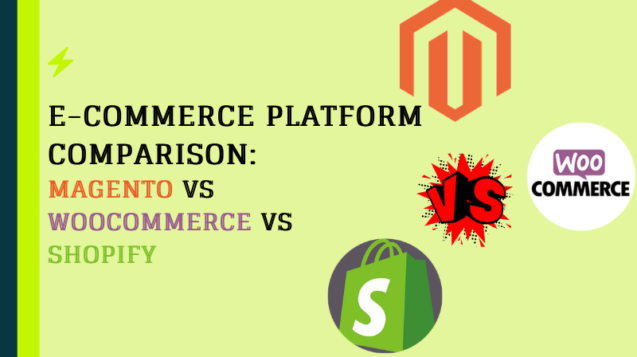E-commerce Platforms Comparison: Magento vs WooCommerce vs Shopify
- trendsbird
- March 23, 2021
- Uncategorized
- No Comments
E-commerce Platforms Comparison: Magento vs WooCommerce vs Shopify
Today we have come up with another interesting and trending topic for you that is “E-commerce Platforms Comparison: Magento vs WooCommerce vs Shopify”. This article may be more important for small businesses because sometimes they have limited budgets.
Based on the statistics of Statista:
- Worldwide retail eCommerce sales amounted to $3.53 trillion in 2019
- E-retail revenues are projected to grow to 6.54 trillion in 2022
The majority of the organizations and businesses chose one of these 3 platforms to build their eCommerce websites.
Comparison is between the 3 biggest E-commerce platforms.
Each one of them is best at their places, so it’s quite difficult to choose from them.
==>Let’s check out the variation between the three with some significant parameters.
>> Ease of use:
Magento:
When it comes to Magento, it demands maintenance, developers with the knowledge, and hosting service.
It is a little bit complicated with Magento and it does not provide facilities such as readymade websites, templates, and other features like other platforms.
WooCommerce:
If you don’t need a customized website or features for your business, you can go ahead with free plugins and themes provided by WooCommerce.
But before that, you will need a WordPress website if you don’t have one.
If you want customization, it will get tricky. So you may need to hire a specific WordPress hosting company that handles the domain and WordPress installation.
Shopify:
This platform provides a free working online store structure. It requires no former knowledge of coding or website development.
With Shopify, you don’t need designing or developing skills, because it provides responsive templates and also payment options. It also provides a hosting service.
>> Performance and scalability:
Magento:
Magento is tremendously strong and easily providing hundreds of products with large website traffic. It is a perfect CMS system for large businesses or on the way to expansion.
There is no barrier or slowdown on the website with unexpected fluctuations in traffic. Magento is an extremely scalable platform.
WooCommerce:
This platform is scalable only for low-budget or small businesses/stores.
When it comes to those who don’t have coding knowledge or experience, it might be difficult to deal with. And in that case, you can say WooCommerce isn’t scalable for you at all.
But if you have some coding backgrounds then you might find it scalable for you.
Shopify:
This platform provides good performance and website speed(one of its main advantages).
If you have higher needs or requirements, then you will have to switch to Shopify Plus for a steady workflow. Which will increase your cost massively.
In addition, Shopify doesn’t function well compared to the other two E-commerce platforms.
>> Design and Customization:
Magento:
Thanks to the open-source environment of Magento, it gives you access to endless customization and Magento extension options for your store design.
Magento grants full room for customization. You can start a theme from scratch or change its features, layout designs, and other things as you want.
WooCommerce:
Just like Magento, WooCommerce also provides the flexibility to customize your website design.
Squeeze your website layout to change the look and feel you want. To satisfy your business needs, you can add unique functionalities.
Shopify:
When we talk about customization, Shopify does not offer that much customization.
You will have to work with default themes and features. And if you want extra features, you need to pay for them.
>> Seo Effectiveness:
Magento:
If you have the needed skills, with Magento you can personalize your website’s requirements.
Magento provides advanced SEO features like integrating site maps, effective google analytics, SEO-friendly URLs, meta description, keywords, and also Automatic image resize.
Expert features require SEO specialists for solution/support with Magento.
WooCommerce:
As WooCommerce is a WordPress plugin, it has all WordPress SEO abilities. It also offers numerous excellent SEO plugins.
You can optimize your store by changing the settings according to your requirements to make the store more attractive and better.
Shopify:
Yes, It is SEO optimized. But it provides basic features to optimize your store’s Google rankings.
You can adjust meta tags, image alt text, and auto XML sitemap, etc. There are various SEO features available for your business but the problem is Shopify doesn’t allow you to expand.
>> Security:
Magento:
It offers so many security extensions and plugins offering a high level of security. Safety & Security is not an issue with Magento being an eCommerce platform.
If you have a team of efficient developers at your end nothing is as secure as Magento. Magento security extensions protect you from threats, scan files for safety, password strengthen, and so on.
WooCommerce:
As we all know, WooCommerce is a self-hosted solution. WordPress keeps updating for bug fixing and security.
Users don’t have to worry about security as the WooCommerce team constantly observes & minimizes threats. You may need help from a hosting provider to get an SSL certificate.
Shopify:
With Shopify, you will not have to worry about being hacked or getting the SSL certificate.
Every time someone visits your website, they’ll find a small lock graphic near your URL. SSL certificate protects personal data and payments of customers and your customer will also feel safe.
It prevents your website and personal information from being leaked.
In Conclusion:
Here we have almost covered all the important factors of these 3 E-commerce platforms that will help you to choose between the three platforms.
You need to consider all the above aspects of each platform to find out which one is appropriate for your business.
If you still find it difficult to make a decision, drive deep into it. Once you are clear with your requirements, decide on suitable E-commerce platforms by thinking about your future plans.
Hope that you can find your solution soon.
Share this article on your social accounts

